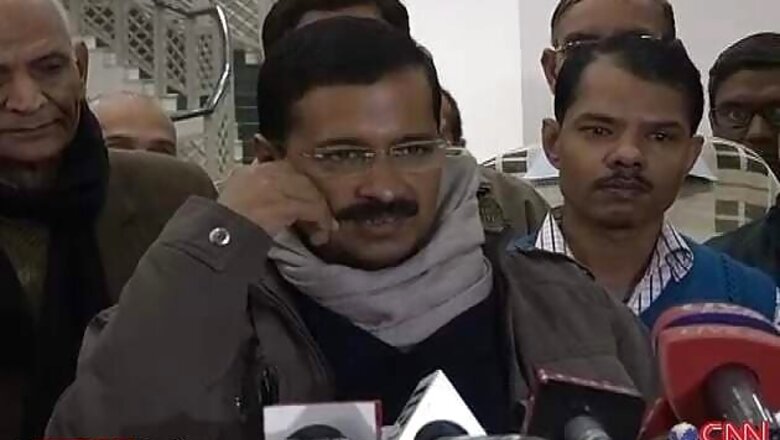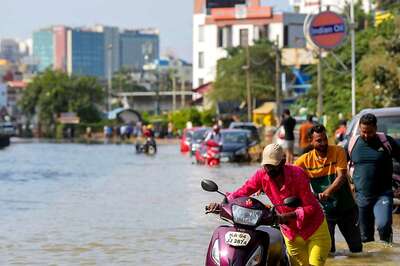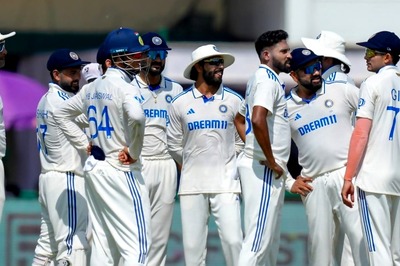
views
New Delhi: The Aam Aadmi Party (AAP) seems to have achieved something impossible. It has brought together completely ideologically opposite people.
Its committee on Police Reforms has both Binayak Sen and Prakash Singh as its members! While Sen is a hardcore Maoist sympathizer and a pro-Marxist, Singh is a retired Director General of Police (DGP).
While Singh's committee recommendations on police reforms are highly appreciated and several state governments are yet to implement them, people wonder how Sen, who considers the police an enemy of the masses can work with Singh.
And the contradictions do not end here.
The AAP committee on Naxalite problems also has both Binayak Sen and retired Police officer EN Rammohan.
As some political observers say the AAP has already become a bundle of contradictions. It has pro-liberalization voices like banker Meena Sanyal, V Balakrishnan, ex-CFO of Infosys, aviation entrepreneur Capt. GR Gopinath and anti-liberalisation voices like Medha Patkar, Ilina Sen, Kavitha Kuruganti and many others.
Captain Gopinath has already slammed the AAP government in Delhi for disallowing FDI stores.
Can this experiment succeed? Can these people with diametrically opposite views work together and co-exist? These are some of the questions the AAP leadership will have to answer in the coming days.
Below is a complete list of the AAP's multiple expert committees to help create policies for the people:
Democratic governance:
A1 Decentralisation through Swaraj:
This policy group shall be looking at evolving an alternative governance structure for the country, which gives greater decision-making power to the people, Swaraj.
The mandate of this group includes exploring devolution of powers to Gram Sabhas and district governments, of smaller states, peoples' participation in policy-making through initatives and referendums, as well as administrative reforms.
Members:
Atishi Marlena
EAS Sarma
KC Sivaramakrishnan
Mohan Hirabai Hiralal
Prashant Bhushan
Ravi Chopra
Uma Shankari
Electoral reforms:
This mandate of this policy group is to suggest electoral reforms that could improve representative democracy
Members:
Satinath Choudhary
Shanti Bhushan
Yogendra Yadav
Police Reforms:
The mandate of this policy groups is to suggest Police reforms to make it less corrupt and more accountable to the people whom it is intended to serve
Members:
Binayak Sen
Prakash Singh
Sudha Bhardwaj
Prashant Bhushan
Judicial Reforms
The mandate of this group is to suggest reforms to make the judicial system more efficient, accessible to poorer sections of society, and more accountable.
Members:
Justice AP Shah
Justice Krishna Iyer
Kamini Jaiswal
Prashant Bhushan
Prashant Kumar
Rahul Mehra
Rajesh Jakhar
Shanti Bhushan
Somnath Bharti
Economy and ecology
This subject committee shall evolve a holistic perspective towards economy and ecology. It shall develop an economic policy along the principles of equity, deepening democracy and ecological sustainability. The committee shall also shape the various policy groups that come within its umbrella. The policy groups shall only be activated after the recommendations of this committee.
Members:
Arun Kumar
Aseem Shrivastava
Avinash Alok
Praveen Singh
Prithvi Reddy
Rakesh Sinha
SP Sethi
List of Policy Groups (some groups are in the process of being formed):
B1 Economic Decentralisation (Including technology choices and cooperatives):
B2 Macro-economic policies:
B2a Tackling price rise
B2b Towards full employment
B2c Foreign Direct Investment
B3 Taxation and black economy:
B4 Industrial Policy (including small scale industry)
B5 Corporate governance and clean business
B6 Agricultural policy (including land reform)
Members:
Gurnam Singh
Kiran Vissa
Kavitha Kuruganti
Ran Singh Arya
Rajinder Choudhary
Sagari Ramdas
Yogesh Dahiya
B6a Land Acquisition and rehabilitation
The mandate of this task force is to develop AAP's Land Acquisition Bill.
Members:
Devinder Sehrawat
RC Rao
Yudhvir Singh
B6b Food security and PDS
B7 Labour policy
B7a Social security for unorganized labour
B7b Contract Labour
B8 Environmental policy and natural resources
B8a National Policy on Water
B9 Energy Policy
B9a Pricing of Petroleum and Natural Gas
B9b Privatisation of power sector
B10 Transport policy
B11 Regeneration of village India
B12 Sustainable Urbanization
B12a Urban slums
School Education for All
The mandate of this committee to provide policy suggestions as to how equitable access to high quality school education can be provided to all children in the country, irrespective of their caste, gender, community or economic background.
Members:
Ambarish Rai
Anita Rampal
Anuradha Joshi
Arati Pinto
Ashok Agarwal
Daksh Lohiya
G. Gautama
Gurveen Kaur
Manish Jain
Vinod Raina
C2 Universal health provisions
The mandate of this committee to provide policy suggestions as to how equitable access to high quality healthcare - both preventive and curative - can be provided to all citizens in the country
Members:
Atul Gupta
Darshan Shankar
KM Shyama Prasad
Madhulika Banerjee
JD Gajjar
Ran Singh Arya
Ritu Priya
C3 Gender Justice
Despite developing in many dimensions, India continues to remain an unjust and inequitable society for women. There are not only instances of sexual violence being common but where there is an unequal access to educational, social and economic opportunities. This group shall suggest policies that can help our country become more gender equitable.
Members:
D Girija
Ilina Sen
Lalita Ramdas
Madhu Bhaduri
Nasreen Fazalbhoy
Pankaj Gupta
Sadhna Arya
Shazia Ilmi
Tripta Wahi
C4 End to caste based inequalities
The mandate of this group is to provide policy suggestions on measures that would end caste-based inequalities that exist in Indian society.
Members:
Anand Kumar
Anand Teltumbde
Chandan Gowda
Darshan Ratan Raavan
Prem Singh Pahari
Rangasamy Elango
Yashwant Sumant
C4a Fine-tuning reservations
The mandate of this task force is to provide suggestions on the changes required to the reservation policies in India
Members:
Anand Teltumbde
Yogendra Yadav
C5 Adivasi issues
Adivasis have historically been one of the most disadvantaged communities in India, and this task-force shall focus on their issues. They shall provide suggestions for creating a just and equitable policy framework for Adivasis (including de-notified tribes)
Members:
Ajay Dandekar
Chittaroopa Palit
Ganesh Devy
Gangasahay Meena
Gladson Dungdung
Habung Peyang
Madhuri Krishnaswamy
Meena Rashakrishna
N. Madhusudan
C6 Secularism and minorities:
Ajit Jha
David Thomas
Imtiaz Ahmed
Rizwan Kaiser
Sandeep Pandey
Shazia Ilmi
C6a Muslim Issues
Members:
AA Latifi
Hashim Pasmanda
Illyas Azmi
Rajeev Kasewa
Sanjeer Alam
Shaista Ambar
Sheeba Aslam Fehmi
Language policy
The mandate of this group is to suggest policies to protect and support India's multi-lingual diversity .
Members:
Abhay Dubey
Chandan Srivastava
Ganesh Devy
Meenati Panda
Pankaj Pushkar
Rahul Dev
D2 Swaraj in ideas and knowledge
Members:
Chandan Srivastava
Madhulika Banerjee
Manindra Thakur
Pankaj Pushkar
Pawan Gupta
D3 Media policy
The mandate of this group is to provide suggestions on policies of media regulation, ownership and accountability
Members
Ashish Khetan
N.R. Mohanty
Paranjoy Guha Thakurta
Shubhranshu Choudhary
Vipul Mudgal
Foreign policy
Members
Admiral L. Ramdas
David Thomas
Madhu Bhaduri
Kishore Asthana
M. Badrul Alam
E2 Internal security:
E.N. Rammohan
Manoj Mitta
Vipul Mudgal
E2a Peace in the North East:
Apurba Baruah
Habung Peyang
Oinam Bhagat
Patricia Mukhim
E2b Naxalite Question
The mandate of this group is to provide policy suggestions for resolving the Naxalite question.
Members:
Ajay Dandekar
Binayak Sen
EN Rammohan
KS Subramanian
Nandini Sundar
Prakash Singh
Rakesh Sinha
Shubranshu Choudhary
E3 External Defense
Members:
Adm. L. Ramdas
Bgd. V. Mahalingam
Cdr. Atul Bhardwaj


















Comments
0 comment